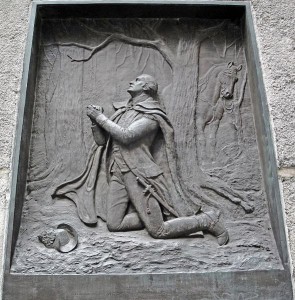 ROWAN COUNTY, Md. — A federal judge in North Carolina has ruled that commissioners in one local county can’t present prayers only in Jesus’ name even if they all are Christians because doing so isn’t “nondiscriminatory” toward other religions and elevates Christianity in government.
ROWAN COUNTY, Md. — A federal judge in North Carolina has ruled that commissioners in one local county can’t present prayers only in Jesus’ name even if they all are Christians because doing so isn’t “nondiscriminatory” toward other religions and elevates Christianity in government.
As previously reported, the American Civil Liberties Union (ACLU) and ACLU of North Carolina Legal Foundation (ACLU-NCLF) had filed suit against the Rowan County commissioners in March 2013, complaining that their invocations have asserted that “there is only one way to salvation, and that is Jesus Christ,” and thank the Lord for the “virgin birth,” the “cross at Calvary” and “the resurrection.”
“I want my local government to be open and welcoming to people of all beliefs,” Nan Lund, a local resident who is among three plaintiffs named in the suit, stated in a news release announcing the legal challenge. “But when officials begin a public meeting with prayers that are specific to only one religious viewpoint, I feel unwelcome and excluded.”
In July 2013, federal Judge James A. Beaty Jr., nominated to the bench by then-President Bill Clinton, sided with the ACLU and the three complainants, ordering the commissioners to end their Christian prayer practice while the case moves forward in court.
“Defendant Rowan County, North Carolina is hereby enjoined from knowingly and/or intentionally delivering or allowing to be delivered sectarian prayers at meetings of the Rowan County Board of Commissioners during the pendency of this suit,” he wrote in his order.
On Monday, Beaty issued his final decision, declaring the prayers predominantly in Jesus’ name to be unconstitutional.
“The practice fails to be nondiscriminatory, entangles government with religion, and over time, establishes a pattern of prayers that tends to advance the Christian faith of the elected commissioners at the expense of any religious affiliation unrepresented by the majority,” he wrote.
Beaty pointed to the 2014 Supreme Court ruling in Greece v. Galloway, which approved city council prayers in Greece, New York that were predominantly–but not solely–Christian. Beaty asserted that Rowan County’s practice was different because the prayers were only Christian since its commissioners all identify as Christians.
“While an all-comers policy is not necessarily required, a nondiscriminatory one is,” he said. “When all faiths but those of the five elected commissioners are excluded, the policy inherently discriminates and disfavors religious minorities.”
However, some are now calling upon the county to appeal the ruling, which they believe runs afoul to the First Amendment to the United States Constitution.
Dean Hunter, a pastor at Central Baptist Church in Kannapolis, told Time Warner Cable News that he would like officials to continue the fight.
“Personal religious affiliation, their relationship with Christ, is being attacked,” he said. “Whatever that religion may be, I believe they have the fundamental basic, constitutional right to pray their religious affiliation.”
In September 2013, following the filing of the legal challenge, hundreds rallied in support of the commissioner’s right to pray in Jesus name—even if no other types of prayers are presented because the commissioners all espouse the same faith.
Become a Christian News Network Supporter...


